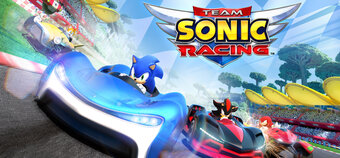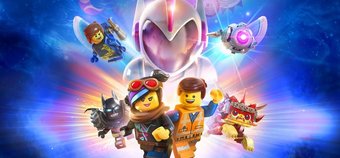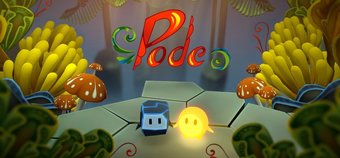With every Nintendo Direct (Nintendo's semi-regular online update videos), Pokémon fans hold their breath hoping for another Pokémon fix. Be it spin off title or main series game, just some Pokémon news with something to look forward to would be nice. During January's Nintendo event, a new game was indeed announced in the form of Pokémon Shuffle - a match three game in the same vein as that other (and incredibly addictive) Pokémon match three game, Pokémon Link Battle. Only this time, there was one big difference. It was free to play. Yes, that's right - after the apparently roaring success(??) of Steel Diver: Sub Wars, Nintendo have decided to dive head first into the morally ambiguous free-to-play category, pairing the limitless money making potential of the business model with their most potent secret weapon. Pokémon. After all, how are you supposed to look at those happy, smiling faces and not part with your cash?
Roll on a few weeks, and the game has now arrived, available to download from the 3DS eShop for free. And it's every bit as money-grabbing as we thought.
At its core, Pokémon Shuffle is a match three game with a difference. On each level, you're presented with a 6 x 6 game board, with 36 tiles of 3-4 different Pokémon covering the screen. Your goal is to make lines of 3 (or more) Pokémon, hopefully creating combos as more Pokémon icons drop from above, in order to damage the Pokémon you are facing on the top screen - but it's how you do this that's a little bit different. Rather than swapping adjacent tiles, you can move any Pokémon to anywhere else on the screen - so long as it makes a match of three or more. On the top screen, you can see the Pokémon you're facing off against, and every move you do will damage that Pokémon. At the end of the level, you'll get a chance to capture that Pokémon. You'll also get coins that you can spend in the in-game store on power ups should you need them, along with a few other goodies every now and then. That's putting the game simply, as things can get a little more complicated than that.
The Pokémon you collect in Pokémon Shuffle actually serve a purpose, as at the start of each level, you have to make a team. Your team consists of four Pokémon you've caught, and become the Pokémon tiles you see and match on the bottom screen. Each Pokémon can make use of type advantage, as in the full Pokémon game (fire beats grass, water beats fire, etc), and each has a special ability. For example Charmander has 'Power of 4' and will do more damage if you create a chain of four Charmanders. If you're not sure which of your captured Pokémon to use, you can press the 'optimise' button and the game will pick a team for you.
Shortly after starting the game, you're also introduced to mega Pokémon, as beating the mega Audino level rewards you with the mega stone Audinite. Should you have caught the Audino from a previous level, you'll then be able to make use of mega Audino in battle. As you make chains of Audino during the level, a little bar at the side of the screen will fill up - when it reaches the top, you can unleash Audino's mega evolution, and transform all your Audino tiles into their mega forms, dishing out more damage. Pokémon will also gain experience for completing a level and could potentially level up, making them stronger, and letting them do more damage.
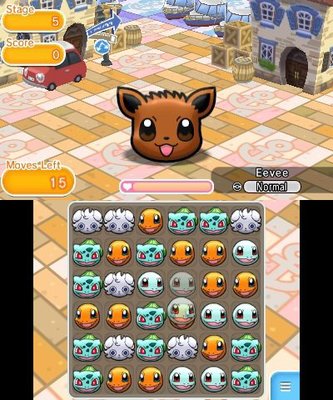
What's strong against normal Pokémon again?
So far, so fun - Pokémon Shuffle, on its own, is an addictive, one-more-go little match three game. But, with this being a free-to-play game, the addictiveness of the gameplay comes at a cost. When you start the game, you're provided with five hearts. Each time you play a level in Pokémon Shuffle, you use one of your hearts, regardless of whether you win or lose the level. That means in theory, you can use up all five hearts trying to beat one level, and have nothing to show for your effort. So what happens when you're out of hearts and want to keep playing? Well, you have to wait. A whopping 30 minutes per heart. With five hearts being the maximum you'll be able to replenish, you'll be waiting two and a half hours to get your five hearts back, or half an hour before you can retry the level.
Of course, this is where the "freemium", or pay-to-play aspect comes in, as if you want to play again immediately, you can - for a price. Pokémon Shuffle has a premium currency called jewels, which you very, very rarely get for completing levels - or can buy from the eShop using real life money. Jewels can then be exchanged in the in-game shop for a stock of hearts or coins, allowing you to carry on playing - at least until the next time you run out. Pokémon Shuffle is also StreetPass enabled, which can reward you with hearts and jewels for meeting certain criteria, although that does rely on meeting people with the game. Note: This reviewer is writing this review while waiting for their hearts to replenish. "Only" one hour left.
And in essence, it's this pay-to-play model that had people concerned when the game was first announced - and it's pretty much as bad as many were worried. Typical of games on mobile devices, Pokémon Shuffle brings the Pokémon franchise into the dark and dirty world of micro-transactions (although some aren't actually all that micro). You have the option to purchase jewels with real money, starting from 89p for 1 jewel, and going all the way up to £42.99 for 75 jewels. Ouch. Jewels of course can be used in exchange for more hearts (instead of waiting), meaning you can play the game for longer. Or, you can continue a level you just failed in exchange for 1 jewel.
Free to play (rightfully) has a really bad reputation. Often misused, especially in children's games, where unsuspecting (and careless) parents have ended up with £100 bills because they've left little Timmy playing a "free" game, they can really risk people's trust in a franchise, and a company. Games like Doctor Who Legacy, Puzzle + Dragons (which has been so successful it's even getting a (non-free-to-play) 3DS game later this year), Simpsons Tapped Out, Family Guy: A Quest for Stuff, the list goes on. All free to download games, but with options to pay for more stuff, or do things faster. How irritating it is depends on what you get for your money, and how it's offered to you in game. To be fair to Pokémon Shuffle, they haven't forced the micro-transaction option on you, but they have done everything they can to gently guide you towards giving them some cash. Still, it's an option, and not a requirement.
This reviewer is currently on level 102 having not paid a single penny, instead waiting every 2 ½ hours to play some more, or spending some jewels obtained through normal game play in exchange for more hearts. Have I wanted to pay for more? Sure, it's a really addictive game. But, if I have the patience, I can progress through the game without the need to do this. The game asks if I would like to spend a jewel to continue the level I just lost, at which point I just tell it where to stick it.
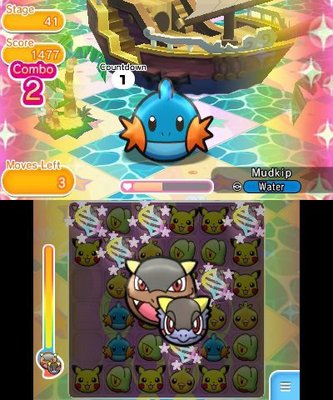
Everyone loves Mudkip.
Away from the sour taste of waiting to play, the game also has a selection of expert stages in which to test your skills. These are unlocked by getting S-ranks on multiple levels (and of course, replaying a level to get a better high score uses one of your five hearts too). These are much harder than the standard levels, and come complete with a time limit which you'll have to work against. If you have your console connected to the internet, there are also various special stages being given out on a regular basis. For example, currently there's a special Mew level available for a few weeks, and some daily Rotom stages. With 150 stages, 159 Pokémon to catch (so far), expert levels, and special stages, there's certainly plenty to do - but you'll have to wait to do it.
So is Pokémon Shuffle the free to play micro-transaction nightmare everyone feared it would be? Sort of. The gameplay is solid, easy to understand, but at times difficult to master, yet it's that same addictive nature that makes it incredibly frustrating to stop playing and wait for 2 ½ hours - unless you're willing to open your wallet. Repeatedly. This is a game designed to keep squeezing money out of you, and milk your love of Pokémon for all its worth. While it would have been nice to have the option to pay a flat sum to remove the stamina cool-down, there's no such option here. With the 3DS eShop's other Pokémon match three game, Pokémon Link Battle being only £7.19 - and that's a one off payment that lets you play for as long as you want - you'd have to be crazy to spend a penny on this. It's fun while it lasts - but waiting to play another stage will eat away at your soul. So, a great game hampered by a reliance on annoying microtransactions then. Or exactly as we'd worried. This isn't what Nintendo games should be like.
Format Reviewed: Nintendo 3DS







